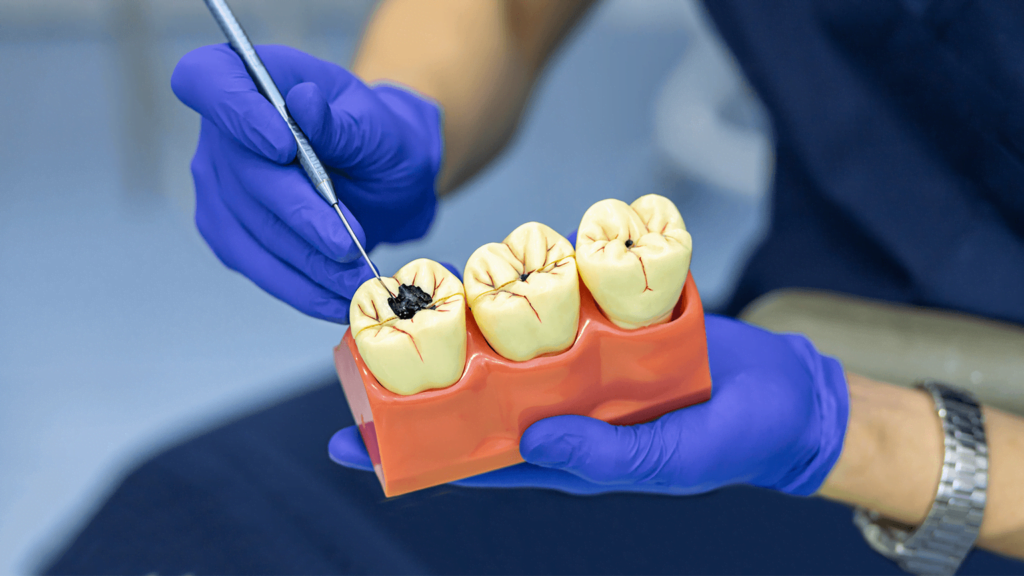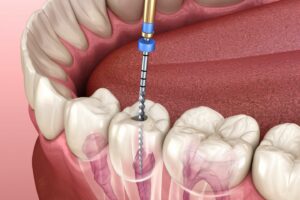Dental cavities, also known as tooth decay or dental caries, are a common oral health issue that affects people of all ages. In this blog post, we will explore the causes of dental cavities, their symptoms, and effective prevention strategies to help you maintain a healthy smile.
What are Dental Cavities?
Dental cavities are permanently damaged areas in the hard outer layer of the teeth (enamel) that result from a combination of factors, including bacteria, acid, and poor oral hygiene. Cavities start small but can progress and cause pain, sensitivity, and even tooth loss if left untreated.
Causes of Dental Cavities
Plaque Formation
- Plaque is a sticky film of bacteria that forms on teeth.
- When plaque comes into contact with sugars and carbohydrates from food and drinks, it produces acids that attack tooth enamel, leading to decay.
Poor Oral Hygiene
- Inadequate brushing and flossing allow plaque to build up on teeth, increasing the risk of cavities.
High Sugar and Carbohydrate Intake
- Consuming sugary and starchy foods and drinks provides a food source for bacteria in the mouth, contributing to plaque formation and acid production.
Acidic Foods and Drinks
- Frequent consumption of acidic foods and beverages, such as citrus fruits and carbonated drinks, can erode tooth enamel, making teeth more susceptible to cavities.
Dry Mouth
Insufficient saliva flow, often caused by medications or certain medical conditions, can increase the risk of cavities as saliva helps wash away bacteria and neutralize acids.
Symptoms of Dental Cavities
- Tooth Sensitivity: Increased sensitivity to hot, cold, or sweet substances is a common early sign of tooth decay.
- Toothache: Persistent or occasional toothaches, especially while eating or drinking, can indicate the presence of a cavity.
- Visible Holes or Pits in Teeth: As cavities progress, they can create visible holes, pits, or dark spots on the affected teeth.
- Tooth Discoloration: Stains or discoloration, ranging from white spots to brown or black areas, may appear on the tooth surface.
Prevention Strategies for Dental Cavities
Maintain Good Oral Hygiene
- Brush your teeth at least twice a day with fluoride toothpaste and floss daily to remove plaque and bacteria.
Limit Sugary and Acidic Foods
- Reduce consumption of sugary and starchy snacks and beverages, and choose healthier alternatives.
- Rinse your mouth with water after consuming acidic foods or drinks to minimize acid exposure.
Fluoride Use
- Use fluoride toothpaste and consider using a fluoride mouthwash to strengthen tooth enamel and prevent decay.
Dental Sealants
- Sealants are thin protective coatings applied to the chewing surfaces of back teeth to prevent plaque accumulation and cavities.
Regular Dental Check-ups
- Visit your dentist regularly for professional cleanings, examinations, and early detection of cavities.
Conclusion
Dental cavities can be prevented through a combination of good oral hygiene practices, a balanced diet, and regular dental care. By understanding the causes, recognizing the symptoms, and implementing preventive strategies, you can maintain a cavity-free smile and enjoy excellent oral health. Remember, early detection and treatment of cavities are crucial for preserving your natural teeth and avoiding more extensive dental procedures. Consult your dentist for personalized guidance and ensure your oral health needs are met.




